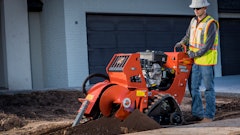
By Tyler Schwandt, Ditch Witch
Compact walk-behind trenchers are increasing in popularity, come in a variety of sizes and can be customized, depending on your business and jobsite needs.
But to get the most out of your machine, you must first match your chain, teeth and sprocket system (CTS) to the ground conditions you’ll be working in. Working with the CTS setup helps keep you as productive as possible on the job. And when it comes to choosing teeth, soil conditions play a big role.
Best Practices for Extending Trencher Component Life
If you use the incorrect teeth for a certain soil or jobsite environment, your productivity and/or equipment performance could suffer unnecessarily.
Which types of teeth are best for each environment?
Not all jobsites are the same, so manufactures offer several chain and teeth options to fit whatever your needs may be.
- Cup tooth — This is a scoop-style tooth used in all soil conditions except rocky, unless used with a combination of shark and alligator teeth. It’s the standard utility tooth.
- Shark tooth — This is a sharper tooth with carbide on the end that slices through tough soils. This is best suited for medium, hard and rocky soils and frozen/frosted ground.
- Alligator tooth — This is a rotating tooth, striking a different edge throughout the entire digging process. This is best suited for hard and rocky conditions.
Back to Basics Trencher Selection - More Tips
What teeth maintenance tips should I know?
It is important to check the teeth on your digging chain regularly and replace any teeth that have fractured or show signs of wear.
As cup teeth wear, you will work through the hard surfacing of the tooth. Signs of excessive wear are noticeable at widest part of the cup, where it will begin to wear into the body of tooth. In cases of extreme wear, the tooth will shear off, drastically reducing productivity.
For shark teeth, inspect the teeth for any chipped or fractured carbide. You should also inspect the tooth below the carbide, as the material will wear away and could cause a fracture.
Specific to alligator teeth, if ever a tooth stops spinning in the bit, it could mean dirt or a rock is stuck. Without checking the parts immediately and resolving the issue, you’ll start to see excessive wear on the side of the tooth that’s always cutting. If you catch this issue early, you can simply replace the bit inside the holder, instead of replacing the entire component.
Strengthen A Trencher’s Weakest Link
As always, when it comes to maintenance, make sure machines are turned off and all workers are a safe distance away before working on your machines. Always check your operator’s manual for machine-specific guidelines and other important safety recommendations.
Tyler Schwandt is Ditch Witch product manager for parts and electronic tools.




















![[VIDEO] Basic Chain Trencher Productivity Tips](https://img.forconstructionpros.com/files/base/acbm/fcp/image/2017/02/default.589242c9b0f8a.png?auto=format%2Ccompress&fit=crop&h=135&q=70&w=240)
![[VIDEO] How Barreto’s New RTK Trenchers Push Production and Reliability](https://img.forconstructionpros.com/files/base/acbm/fcp/image/2017/01/default.587818db6cca5.png?auto=format%2Ccompress&fit=crop&h=135&q=70&w=240)





![[VIDEO] Ditch Witch Introduces Opticut and Spring Boom Features to New Walk-Behind Trencher Line](https://img.forconstructionpros.com/files/base/acbm/fcp/image/2016/03/default.56d70aa2bcf8e.png?auto=format%2Ccompress&fit=crop&h=135&q=70&w=240)
![[VIDEO] Ditch Witch Unveils Six New Walk-Behind Trenchers](https://img.forconstructionpros.com/files/base/acbm/fcp/image/2016/03/default.56d6f9143dad0.png?auto=format%2Ccompress&fit=crop&h=135&q=70&w=240)

